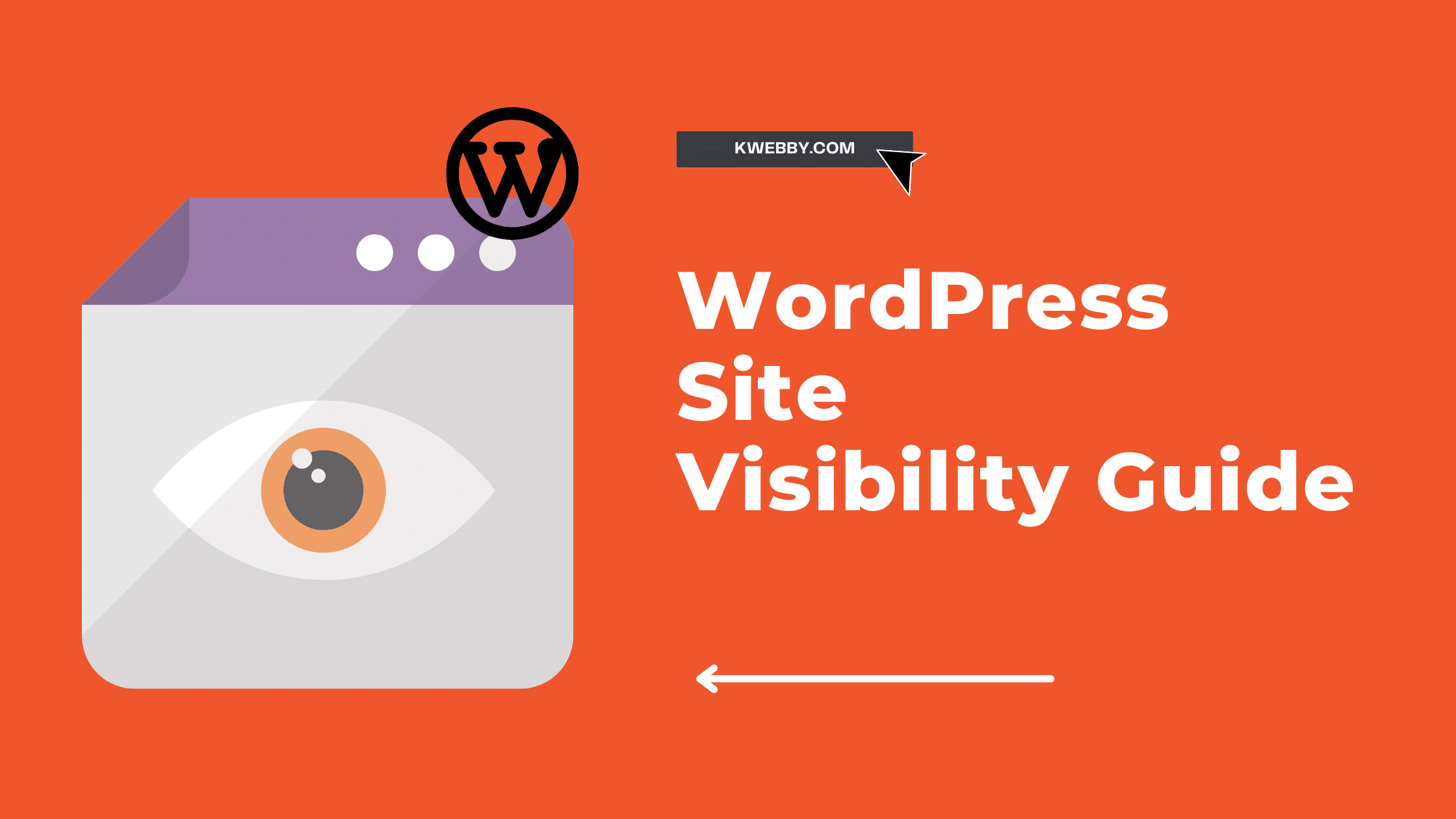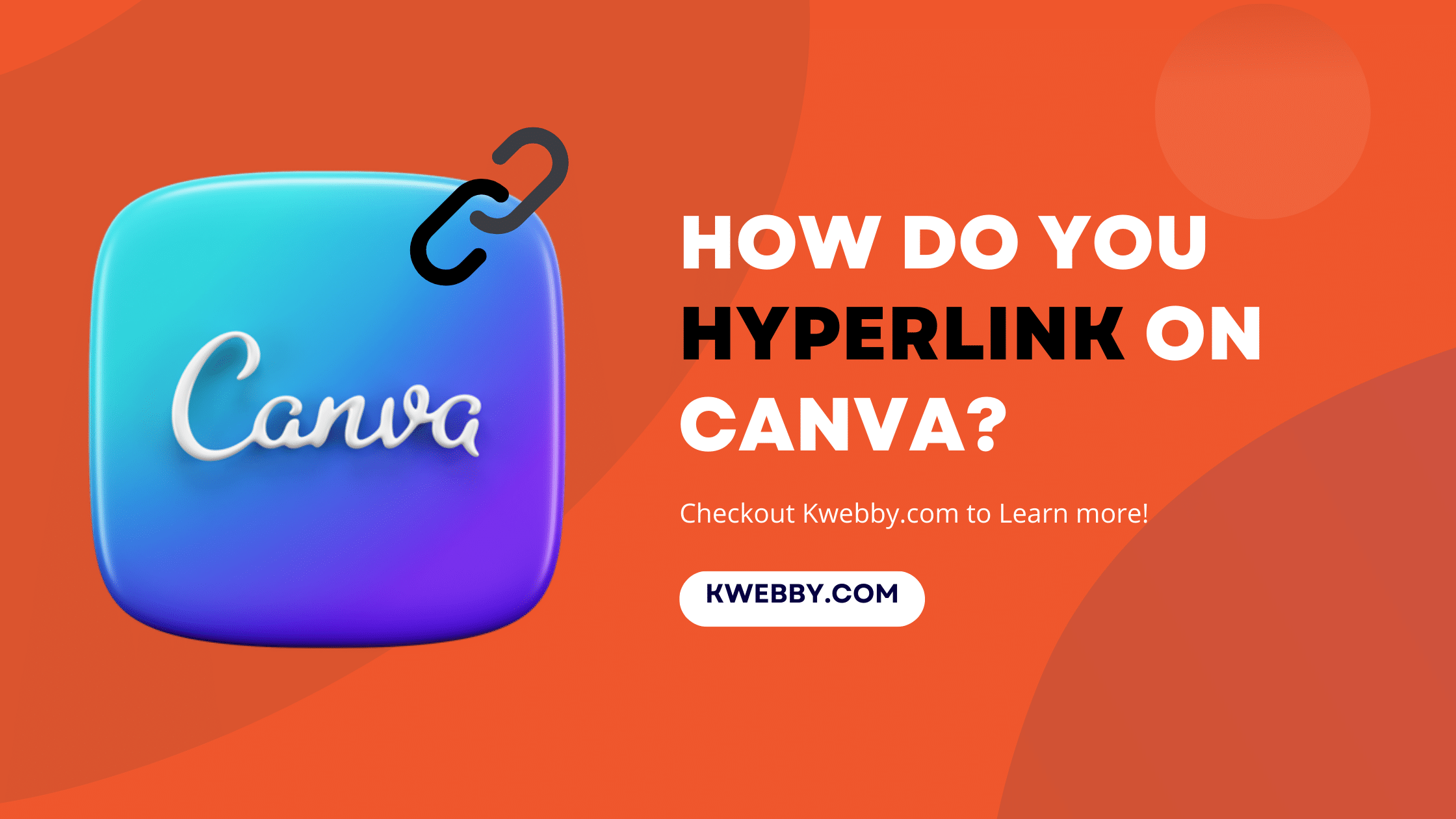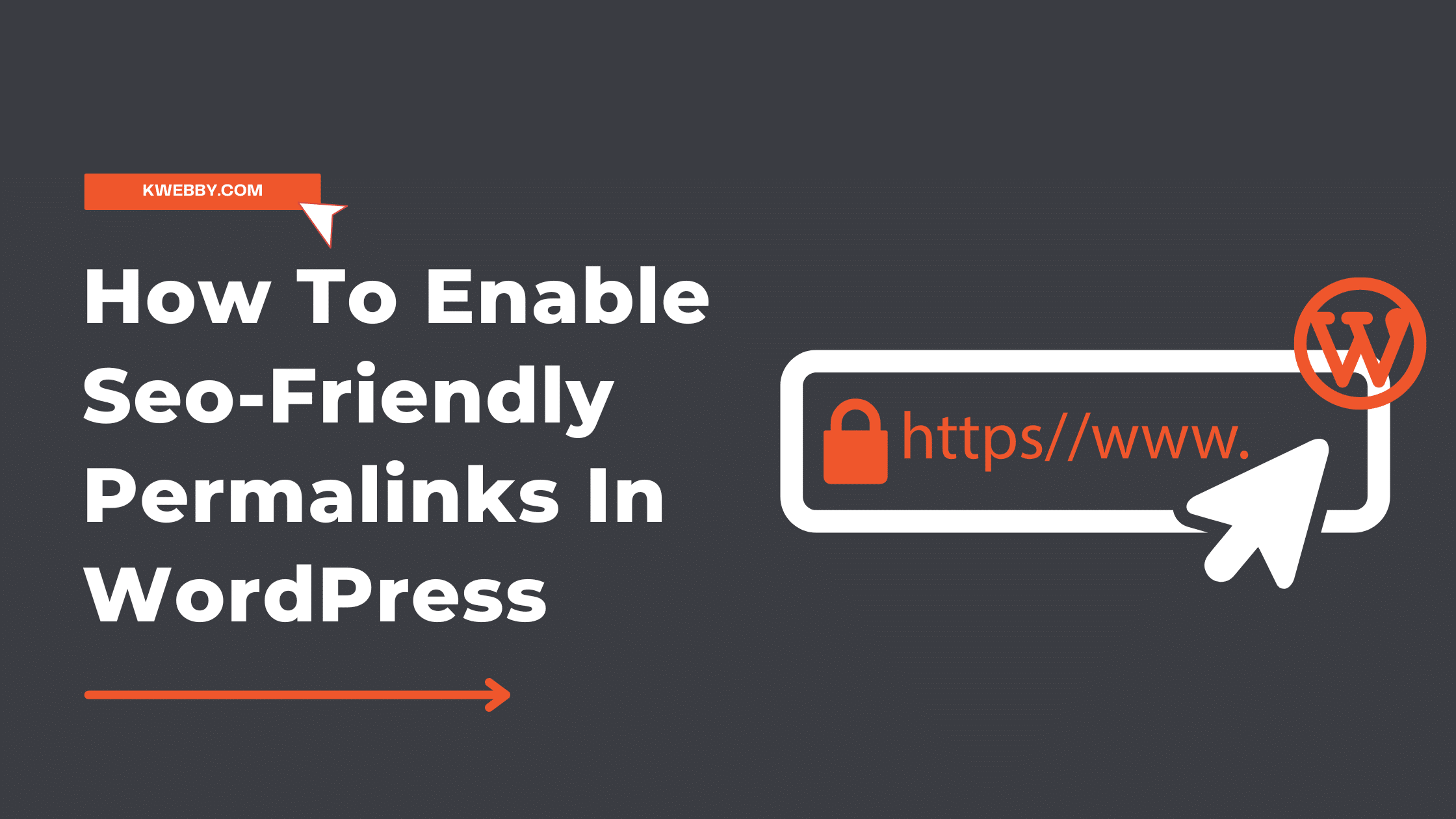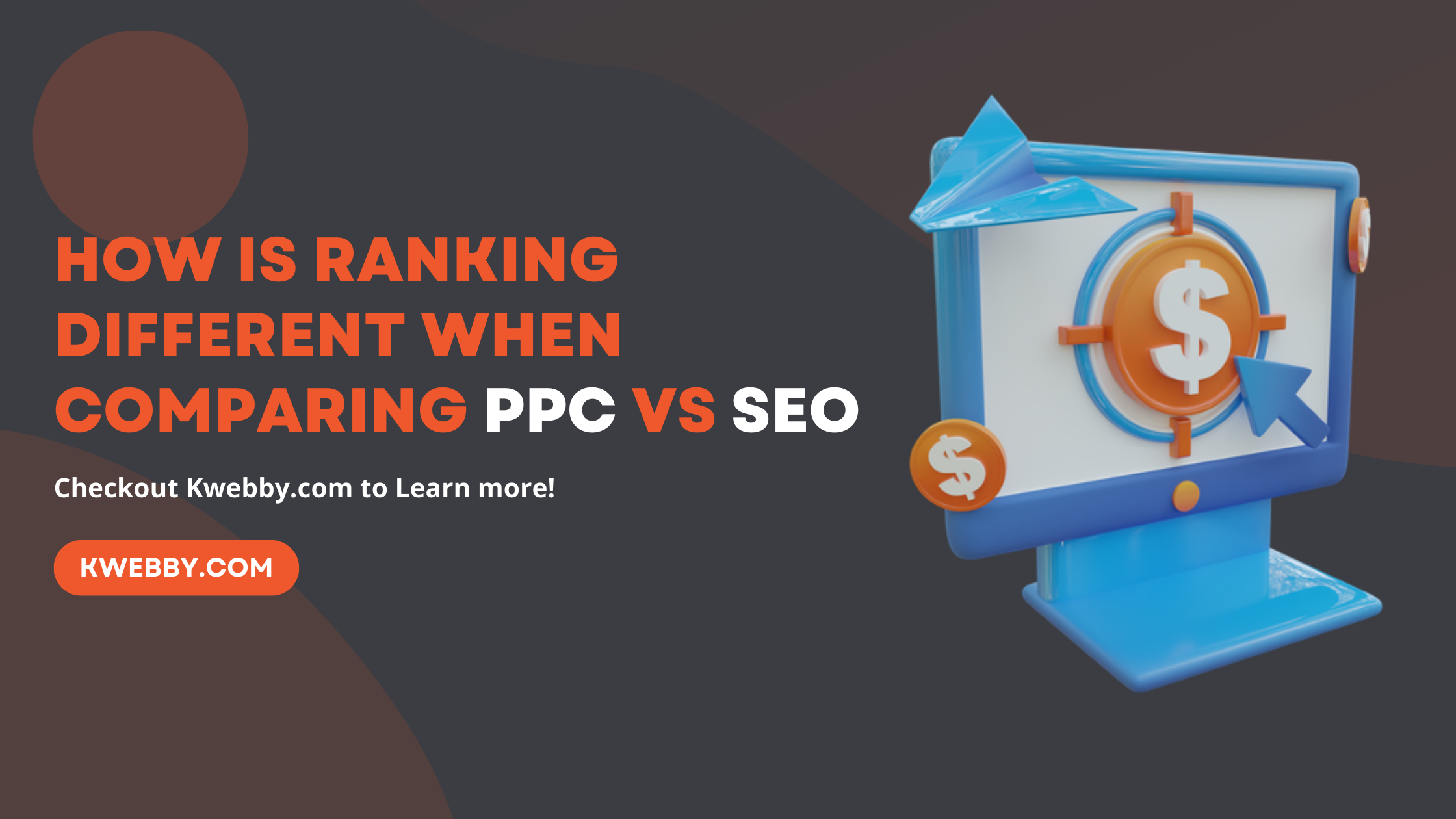
How is Ranking Different when Comparing PPC vs SEO (8 Keypoints)
When delving into the world of digital marketing, one encounters numerous strategies designed to enhance online visibility and drive website traffic.
Among these, Pay-Per-Click (PPC) and Search Engine Optimization (SEO) are two predominant approaches that many businesses employ.
Although both are geared towards improving rankings on search engine result pages (SERPs), their methodologies and implications are distinctly different.
In this article, we will shed light on how the ranking differs when comparing PPC vs SEO, providing you with insights to make informed decisions for your digital marketing strategies.
What is the Difference Between PPC and SEO?
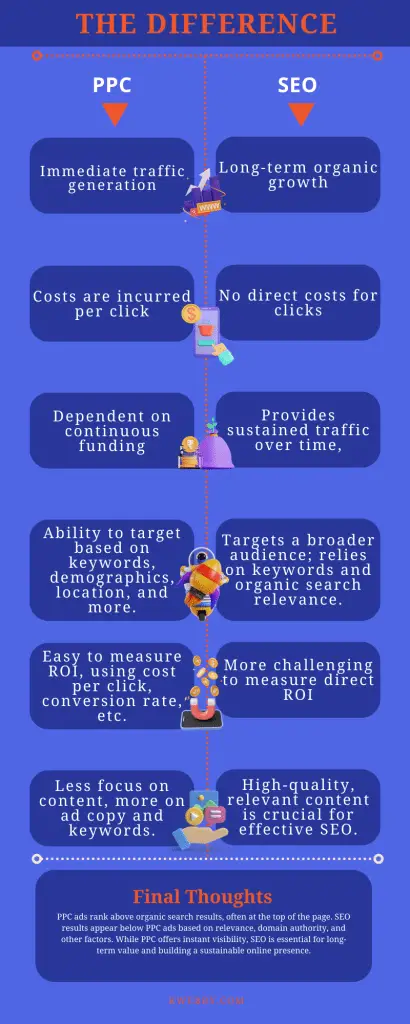
PPC and SEO are both strategies to enhance your website’s visibility on search engine result pages, but they operate on different principles.
PPC, or Pay-Per-Click, is a model of Internet marketing wherein advertisers pay a fee each time one of their ads is clicked. It’s essentially a way of buying visits to your site, rather than attempting to earn those visits organically. Google Adwords is the most popular PPC advertising system. This platform allows businesses to create ads that appear on Google’s search engine.
On the other hand, SEO, or Search Engine Optimization, is the practice of increasing the quantity and quality of traffic to your website through organic search engine results without any direct payment. It involves optimizing your website with relevant and quality content, appropriate keywords, backlinks, and technical SEO to improve its visibility in the organic, or unpaid, search engine results.
PPC ads rank above organic search results, often at the top of the page. SEO results appear below PPC ads based on relevance, domain authority, and other factors. While PPC offers instant visibility, SEO is essential for long-term value and building a sustainable online presence.
Also learn, How to Measure SEO Performance (10-Step Checklist)
Benefits of PPC and SEO
Both PPC and SEO offer unique benefits to businesses, and understanding these can help you determine which approach best suits your marketing goals.
Immediate Results: Once your PPC campaign is approved, your ads will immediately appear in search results. This can lead to instant visibility and increased traffic.
Target Specific Audiences: PPC allows you to target specific demographics, locations, and even times of day for your campaign, giving you more control over who sees your ads.
Budget Control: In PPC, you decide how much you want to spend per click and day, allowing for better budget management.
Measurable Results: With PPC, you can track the number of clicks, conversions, and the overall ROI of your campaign, making it easy to calculate the effectiveness of your efforts.
Sustainable Results: SEO may take longer to show results, but the traffic generated through organic search remains consistent and sustainable over time.
Cost-effective in the long run: Unlike PPC, where you pay for each click, SEO is an investment that can continue to drive traffic to your site without any additional costs.
Improve Overall Website Quality: To rank well in SEO, you need to have a well-designed website with quality content, providing an incentive to improve your overall online presence.
Also learn, How Voice Search is Changing SEO (And Tips to Optimize)
How is Ranking Differ when Comparing PPC vs SEO?
The ranking difference between PPC and SEO fundamentally lies in their execution and outcomes. The two strategies also differ in terms of cost, control, and credibility.
In the following sections, we will delve deeper into these differences to help you understand how PPC and SEO rankings differ, enabling you to tailor your digital marketing strategy to your specific needs and goals.
Paid vs. Organic Ranking

Search Engine Optimization (SEO) and Pay-Per-Click (PPC) advertising are both effective strategies for enhancing a website’s visibility on Search Engine Results Pages (SERPs). However, one key difference is the method of achieving this visibility.
SEO efforts aim to improve organic search rankings, attracting free traffic from search results. This is a long-term strategy and requires consistent effort, as organic SEO is influenced by numerous ranking factors such as the relevance of content, use of relevant keywords, and off-page SEO techniques like backlinks.
On the contrary, PPC advertising or paid ads allow businesses to pay for visibility on the search engine results page. Advertisers bid on specific keywords, and if their bid is high enough, their ads are displayed on the SERPs, often at the top.
The placement of PPC ads on the results page is determined by the ad rank, a metric calculated based on the bid amount and the quality of the ad, landing pages, and other crucial metrics like click-through rate. Therefore, a well-optimized PPC campaign can potentially outperform organic search results, but at the cost of ad spend.
Also learn, 20 Types of Keywords in SEO (With Examples)
Immediate Results vs. Long-Term Results
When considering the question of how is ranking different when comparing PPC vs SEO, it’s essential to understand the time frames associated with each digital marketing strategy.
PPC, or Pay-Per-Click, offers immediate results. By investing in PPC campaigns, businesses can gain instant visibility on search engine results pages (SERPs), capturing the attention of their target audience and driving immediate traffic to their web pages. This approach is particularly advantageous when aiming to promote time-sensitive offers or when a new website is launching and needs to generate leads quickly.
In contrast, SEO efforts, specifically organic SEO, are geared toward long-term results. Improving organic rankings on search engines doesn’t happen overnight. It involves a consistent application of SEO strategies such as creating quality content with relevant keywords, building credible backlinks, and ensuring the website is technically sound.
While it may take time to see results, the organic traffic that it draws tends to be more sustainable. The first page of search engine results tends to generate the most clicks, but getting there requires patience and ongoing effort.
Therefore, the decision between focusing on PPC and SEO may come down to your business’s immediate needs and long-term goals. Both PPC and SEO play critical roles in a comprehensive digital marketing strategy, and understanding how the ranking differs when comparing PPC vs SEO is crucial in making informed decisions for your business’s online presence.
Also learn, How to Optimize Meta Title and Meta Description for SEO in WordPress in 2024
Click-Through Rates (CTR)
One of the key performance indicators in both SEO (Search Engine Optimization) and PPC (Pay-Per-Click) is the click-through rate (CTR). CTR is the ratio of users who click on a specific link to the number of total users who view a page, email, or advertisement.
For example, if your ad received 5 clicks and was shown 100 times, then your CTR would be calculated as follows: 5 ÷ 100 = 0.05 or 5%. This means that for every 100 times your ad was displayed, it received 5 clicks.
In terms of search engine results pages (SERPs), a higher CTR can contribute to improving a website’s organic ranking. This is because search engines like Google consider CTR as one of the ranking factors, associating high CTR with relevant and quality content that provides value to its users. Therefore, enhancing your SEO strategy to improve CTR, such as optimizing meta descriptions, title tags, and URLs with specific keywords, can lead to better organic search results.
On the other hand, CTR is a crucial factor in determining the success of a PPC campaign. For paid advertising on search engines, a higher CTR means that more of your target audience is clicking on your ads. Therefore, optimizing your PPC campaigns by running ads with compelling copy, targeting specific keywords, and ensuring higher ad placement can help improve CTR and generate immediate visibility on the search results page.
Also learn, How to Optimize Images for SEO In WordPress in 2024 (Only Guide You Need!)
Position on SERPs

Understanding the position of your website on Search Engine Results Pages (SERPs) is crucial when comparing PPC and SEO. Organic rankings on SERPs are influenced by a myriad of ranking factors, such as the relevance of content, use of particular keywords, and off-page SEO techniques like backlinks. It’s a meticulous process that requires SEO experts to analyze SEO analytics and strategize to meet the ever-changing SEO algorithms of search engines.
Conversely, PPC (Pay-Per-Click) allows businesses to pay Google and other search engines for top positions on SERPs and visibility on relevant partner websites. To improve PPC rankings, advertisers run ads and bid on specific keywords related to their business.
The position of these ads on SERPs is determined by an ad’s rank, which is calculated based on the bid amount, the quality of the ad, and other crucial metrics like click-through rate. This form of paid advertising can quickly generate traffic to your website, delivering immediate results.
Duration of Visibility
When comparing PPC and SEO, the duration of visibility on SERPs is a significant factor to consider. PPC campaigns, once paid for, guarantee immediate visibility on search engines.
As a result, they can provide a quick boost in traffic, particularly for short-term marketing campaigns or promotions. However, the visibility of PPC ads is directly tied to your ad spend. Once you stop paying for the ads, the visibility ceases, and your paid rankings can vanish overnight.
On the other hand, SEO, or Search Engine Optimization, is a long-term strategy aimed at improving organic traffic. The work of an SEO expert involves optimizing a website’s content and structure to gain better visibility over time.
Actions taken today in SEO may take months to yield results, but once a high organic ranking is achieved, it tends to be more stable and lasting, holding its ground on the SERPs even without continuous investment. SEO efforts, unlike PPC, are less susceptible to fluctuations and can provide a steady stream of organic traffic.
While SEO does require a significant amount of time and effort, the results can be highly beneficial. High organic traffic indicates that your website is considered trustworthy and relevant by search engines, which can significantly enhance your brand’s credibility. Also, SEO is not just about search engine visibility but about making your site better for people too.
Therefore, the choice between PPC and SEO, or usually a mix of both, depends on your business’s immediate needs and long-term objectives. Utilizing the expertise of an SEO expert for a well-structured SEO strategy can help your site gain sustainable organic traffic.
Simultaneously, PPC can boost your visibility rapidly, especially when you want to draw attention to a new product or a short-term offer. Both strategies have their strengths and play an essential role in a well-rounded digital marketing strategy.
Credibility And Trust
Ranking on search engines is not just about visibility; it also speaks volumes about your brand’s credibility and trustworthiness. With SEO (Search Engine Optimization), sustainable traffic is acquired through consistently high-quality content and effective keyword utilization. This can lead potential customers to view your website as a reliable source of information, thereby increasing trust in your brand.
On the other hand, PPC offers immediate visibility on search engines and social media platforms with its paid ranking feature. When executed properly, a strategically designed PPC ad campaign can imply a strong market presence, which can also enhance your brand’s credibility. However, trust garnered through PPC is often contingent on the perceived quality and relevance of the ads.
Both SEO and PPC have unique merits in building credibility and trust among potential customers. SEO fosters long-term relationships with users by providing them with valuable content over time, while PPC piques immediate interest with prominent ad placements.
Quality of Traffic
The quality of traffic drawn to your website is another critical distinction when comparing PPC and SEO. With SEO, traffic is typically considered more organic and high-quality.
When your website ranks high organically in search engine results, it means that users actively searched for keywords related to your business or product, and your website provided the answers they were seeking.
This kind of traffic often leads to higher engagement rates and better conversion rates because these users have a genuine interest in what you offer.
However, PPC campaigns can also generate high-quality traffic, especially if the campaigns are well-targeted. With PPC, you have the advantage of precision targeting.
You can decide exactly who to show your ads to based on various factors including demographics, interests, and specific keywords. This allows you to reach users who are most likely to be interested in your product or service. However, PPC traffic can sometimes lead to lower engagement if users feel the ad they clicked on did not meet their expectations.
Level of Competition
The level of competition is another critical aspect to consider when comparing SEO and PPC. In the realm of SEO, competition is based on the quality of content, keyword optimization, and efficient use of SEO strategies by businesses in the same industry or niche.
Sites that are best optimized for relevant keywords and Google’s ranking algorithms generally enjoy better organic visibility. The competition can be stiff, with businesses vying for top spots on search results for coveted keywords.
On the other hand, competition in PPC depends largely on the level of ad spend and the effectiveness of ad campaigns. Advertisers bid for the same or similar keywords, and those willing to pay more often secure higher ad placements.
However, it’s not just about outbidding competitors. The quality of the ad, the relevance to the searched keywords, and the landing page experience also play pivotal roles in determining ad rankings. When multiple businesses target the same audience, competition for ad placement can become quite fierce.
Conclusion
In conclusion, both PPC and SEO play pivotal roles in shaping a brand’s digital presence and visibility. The choice between these strategies, or a combination thereof, ultimately hinges on a business’s specific needs, timelines, and long-term objectives. By understanding the distinct mechanics of both PPC and SEO ranking, businesses can better strategize their digital marketing efforts and maximize their return on investment.
Frequently Asked Questions
How does search engine optimization affect my ranking on search engines?
SEO directly impacts your website’s visibility on search engines. By optimizing your site for relevant keywords, creating valuable content, and improving the user experience, you can improve your site’s ranking on SERPs. A higher ranking enhances your visibility to potential customers, leading to increased organic traffic.
How long does it take for SEO efforts to show results on search engine results pages?
SEO is a long-term strategy, and it often takes several months to start seeing results. However, once your website starts ranking high on SERPs, the results can be sustainable and long-lasting.
Can I control who sees my website on search engine results pages?
With SEO, you can influence who finds your website through their search queries by optimizing for specific keywords. In the case of PPC, you have more control over your audience as you can target ads based on demographics, interests, and specific keywords.


